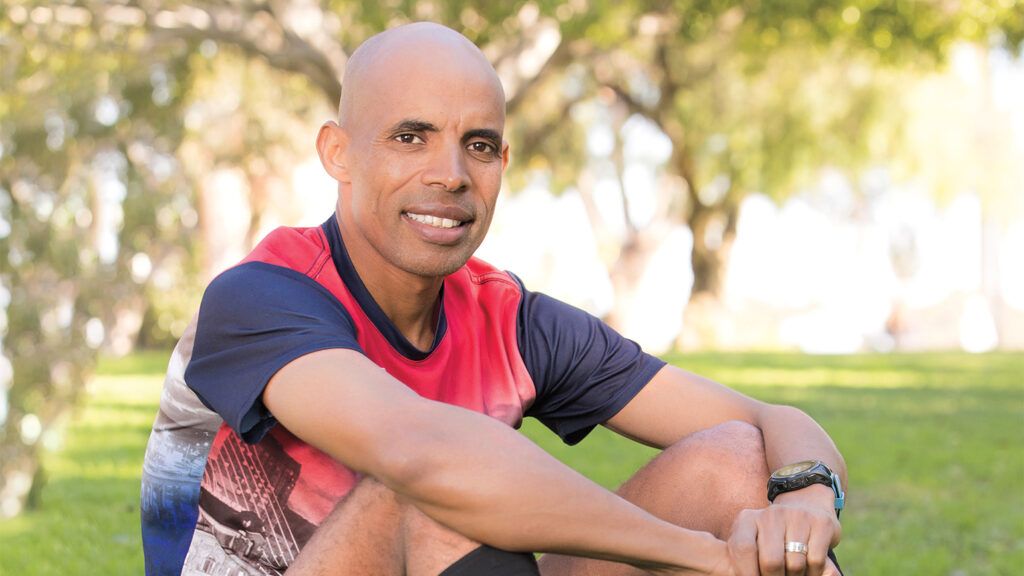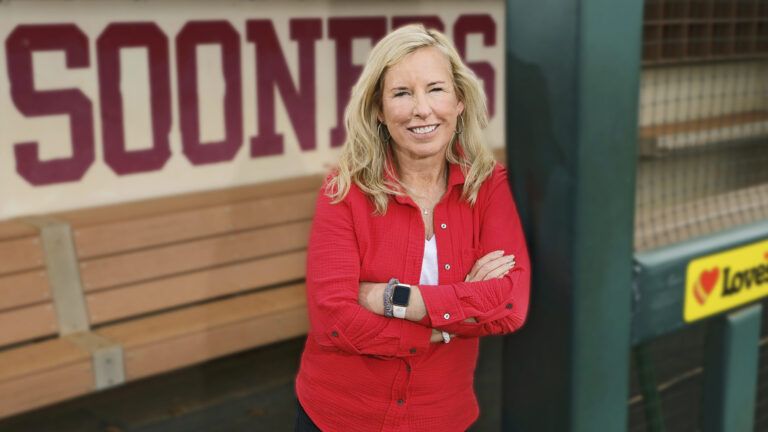Mile 12. The 2017 Boston Marathon. I was cruising, a mile short of the halfway point in one of the most prestigious races on the planet. Besides the Olympics, it doesn’t get any bigger. For once I’d done everything right. The diet. The training. My mental and spiritual focus.
The fans along the tree-lined streets of Wellesley, Massachusetts, were cheering like crazy: “Let’s go, Meb!” “USA! USA!” I’m no longer surprised at people recognizing me. I’d run marathons since 2002, the only runner to have finished first in New York and Boston and medal at the Olympics.
No American man had won here in more than three decades before I crossed the finish line in 2014, the first Boston Marathon after the horrific bombings. A few days before the race, I met the Richard family, who had lost their eight-year-old son. Their strength inspired me. Even for someone used to the spotlight, it was an unforgettable experience. God’s hand had surely been working through me.
Now I was back. At 41, I was way older than the other elites. Still, a top-three finish seemed possible. I was firing on all cylinders, almost to Wellesley College, where the students mass along the route, hollering like mad—the Scream Tunnel, it’s called.
Just before a little hill, the runners ahead of me began to pick up the pace. No problem. I pumped my legs harder. But the other runners pulled farther away. Pick it up. I had nothing. There was no soreness. No tightness. My quads were just dead. Like a car stuck in second gear.
I pray constantly when I run. Running 26 miles is mentally and physically taxing for even the most experienced runner. Every time I take it on, I vow never to do it again. Every muscle in my body aches. It’s days before I’m able to walk normally again. But exhaustion wasn’t usually an issue until the last two or three miles. I still had half the race to go. Like any marathoner, I’d lost way more than I’d won. I didn’t expect God to give me a victory every time. But I’d always been competitive. Until now. Lord, I’m done. I can’t do this anymore.
Growing up in San Diego, California, I’d never imagined myself as a world-class runner. I’d been born in Eritrea, a small war-torn country on the Horn of Africa. We lived in a stone hut with no running water, no electricity. When I was five, my father—a freedom fighter in a war against Ethiopia—had fled for his life. He’d walked 225 miles over seven days to get to the Sudan—the equivalent of a marathon every day for a week.
Seven years later, we immigrated to the United States. “God has great plans for you,” my father said. He insisted my siblings and I excel at school. He woke us up at 4:30 a.m. to study.
I’d been in America for a year when my seventh-grade gym teacher said, “Today we’re going to run the mile. Do your best and I’ll give you an A.” I finished first. The teacher stared at his stopwatch. “You ran a 5:20 mile…without any training,” he said. He called the high school coach. “We’ve got a future Olympian here.”
I kept winning races, in high school and college, at UCLA, running 5Ks and 10Ks. In 2001, I set the U.S. record for 10,000 meters. My coach convinced me I had potential as a marathoner. I started training and, in 2002, finished ninth in the New York City Marathon. It was November. I was cold, my body stiff, aching. I was miserable. My parents had come to watch. “You don’t need to do marathons,” my mother said.
Two weeks later, I traveled with my mom to rural Eritrea for the first time since I’d left. I watched how people carried water from wells miles away. How they searched constantly for wood for fires for cooking and heat. I remembered again the distance my father walked so we could escape this life. Running was the talent God had blessed me with. I would honor that gift.
Two years later, I finished second in the world at the 2004 Athens Olympics marathon. My hard work had paid off. But when I told people I was a marathoner, they’d say, “You’ve run Boston?”
So that’s what I set my sights on. When my wife, Yordanos, and I were looking to buy our first house, I considered how many hills were nearby, thinking of the Boston Marathon.
I ran Boston in 2006 and finished third, with a time of 2:09:56, more than a minute faster than my Olympic time. I got why Boston was such a big deal. The hills, a steep drop at the start and the legendary Heartbreak Hill at Mile 17, were killers. But what really set it apart were the crowds lining the course almost the entire way: loud, raucous, seriously into it. For the first time, I wore a USA jersey and a bib with my first name. I felt part of something way bigger than me, like I was being welcomed into an entire community, all of us bonded by a love for running and country.
Now, in 2017, as I entered the Scream Tunnel, I needed that encouragement more than ever.
The races that followed that first Boston Marathon were some of the toughest of my career. Seven months later, I finished in twentieth place in New York City after having food poisoning. Then at London I dropped out when my Achilles tendon began bothering me, the only marathon I ever quit. I struggled through two marathons after that. I thought about retiring. I suffered a pelvic stress fracture. I was 33. The average age of an elite marathoner was 29. Was I past my prime?
I prayed on it and searched deep within myself. I felt as if God still had plans for me. I had to get smarter. For a time, I quit running and took up water aerobics. I met some amazing older folks who inspired me with their own determination. I went to the Olympic Training Center in Colorado Springs. I was more careful about what I ate. I designed my workouts to be kinder to myself. I took more time off, seeing the value of resting my body. I focused on consistency rather that pushing myself harder. One of the best tips came from Yordanos. “You’re too aggressive at the beginning,” she said. “Pace yourself.”
Late in September 2009, I woke with a start. “I dreamed I won the New York City Marathon,” I told Yordanos. She looked at me sympathetically.
“You haven’t heard,” she said. At a British half marathon that morning, two runners from Kenya and Morocco had set a blistering pace, faster than I could run.
I thought about the changes I’d made. New York was two months away. “They’re peaking too soon,” I said. “I’ll be ready.”
That November, I won the New York City Marathon, just as I had in my dream, 40 seconds faster than my third-place finish in Boston three years earlier. Then came a first-place finish in the 2012 Olympic trials, then that incredible day in Boston in 2014. All those people cheering me on. Age was just a number, I told myself. I felt invincible!
How wrong I had been. I felt as if I were 81, not 41. Somehow I managed to keep going, through the Newton Hills, over Heartbreak Hill, past Boston College. At last I made it to Boylston Street, in the heart of Boston. The crowd was six, seven people deep, everyone calling my name. “You’re the man, Meb!” “Go get ’em, Meb!” It was as if they didn’t even realize how badly I was doing. I crossed the finish line in thirteenth place, with a time of 2:17, more than eight minutes slower than my victorious run just three years earlier.
I saw the Richard family and ran over and hugged them. “Great race!” they said. “Thanks,” I said, forcing a smile.
Flying home, I dissected each mile of the race, looking for what I could’ve done differently. “You’ve had a great career,” Yordanos said. “Be proud of what you’ve accomplished and thank God.”
Thankful? For thirteenth place?
I thought about the crowds. The incredible support they’d given me every time. They didn’t care how I did. They’d carried me across the finish line. Yes, being a marathoner was about something way bigger than me. It was about inner strength, perseverance, discipline, faith. The same traits I’d admired in my father. The people of Eritrea. And the survivors of the Boston bombing. It took me coming in thirteenth to understand what it all meant. God had blessed me in ways I could have never imagined as a boy in Africa. It was up to him how I used my gift.
Seven months later, I ran my last marathon, my 26th, in New York City. I finished eleventh out of 50,766, but this time I didn’t mind. I’d done my best, just as I had that day in seventh-grade gym class. That’s what mattered. I’ve retired from professional running, but I haven’t left the sport. I serve as a race ambassador at marathons, encouraging amateurs and pros alike, and even running the occasional charity marathon. For me, it’s a kind of ministry, a way of paying forward all the people who were there for me.
For more inspiring stories, subscribe to Guideposts magazine.






